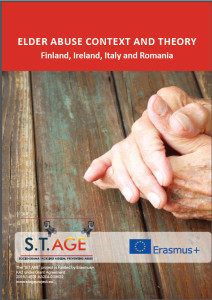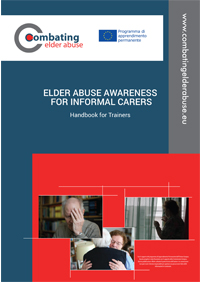The context
With population ageing, the percentage of populations aged 65 years and over is estimated to increase in Europe from 16% (2010) to 25.6% by 2040. According to Eurostat Statistics population projections (2011) the percentage of people aged 65 years and over in the four countries involved in this project will increase to 20.2% in Ireland, 25.4% in Romania, 25.5% in Finland and 29.8% in Italy by 2040. Hence elder abuse is a European wide issue that has the potential to impact on the lives of a growing number of people. Ways of educating older people themselves and those that provide care and support to them is hugely important and paramount if people are to lead dignified, secure and fulfilled lives as they age. A significant body of empirical evidence points to deficits in awareness, knowledge and confidence among health and social care professionals in relation to elder abuse and documents the limited provision of education and training in the area.
This programme aims to provide learning opportunities to build awareness of elder abuse and the knowledge and skills to recognise it tailored to formal carers and older people, particularly those receiving care in day centres and residential settings. In this way increase the capacity of those living/attending and working in day centres and residential care settings to act preventively and empower disclosure.
Background theory:
This 24 months project applies in a practical way, for the first time we are aware of, the theory of ‘generational intelligence’ (Biggs, 2014). Emerging theories in explaining elder abuse within individual relationships suggest abuse occurs where there is a failure to encounter the humanity of the other. Bigg’s hypothesis is that prevention needs to focus on building generational intelligence. The principle of this theory is that by recognising differences between generations, there is greater empathy amongst carers, many with different cultural backgrounds, so they come to really know the older person as an individual from a particular generation and culture, and this way not just provide care to the person but care about them.
To learn more:
Elder Abuse, Social Ageism and Human Rights
The objectives are:
– to design an education programme that will provide new learning opportunities in the field of human rights and empathy to prevent abuse. Traditional learning opportunities explicitly focusing on elder abuse may be ineffective or refused by the target group, as abuse can be unintentional due to lack of awareness and taboo nature of topic. Hence the methodology will use creative tools including socio-drama to deliver the programme in day care centres and residential settings.
– the empowerment of older adults though education on human rights and the exploration of ways of safeguarding well-being
– to foster empathy amongst formal carers abuse, ‘to walk in older person’s shoes’, challenge ageism
– develop educators competences on the topic
– to input into care settings’ elder abuse policy
The target groups to be addressed are
– older adults, particularly those in care settings, who lack the opportunity to engage in learning on human rights and elder abuse, yet are a group most in need due to increased disability and reduced social networks
– Professionals and formal carers, many from a different generation, unaware of role ageism can play in creating environment for abuse, learning opportunities limited.
The transnational element of the project is also important as countries involved represent different social models but are also at different stages in the development of elder abuse policy and practices, engendering shared learning.
Project will meet common need of all EU countries to find new ways to educate, and provide older people and formal carers with the skills to protect themselves and those they care for.
The leaflet of the project – English
The leaflet of the project – Italian




